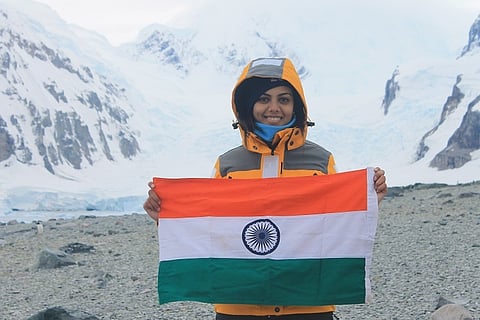

In the past two years, Avani Awasthee has been on two expeditions to Antarctica. And though each time the experience has left her mesmerised, it has also made her aware of how climate change is eating way at the continent's glaciers and the dire impact it could have on the planet.
The 20-year-old media student from Pune recently returned from her second trip to the coldest continent. She had been invited to participate as a mentor in a nine-day expedition which had 87 people from 20 nations and which was part of Project 2041, an initiative started by renowned polar explorer Robert Swan. 2041 is the year when the Antarctica treaty, which aims to protect the continent, expires.
As part of the project, people from around the world are taken on an expedition to Antarctica where they can see first-hand the impact of climate change on the environment. Research shows that an increase in global warming will accelerate the melting of the ice on the continent, which in turn could have severe consequences for the entire planet.
Avani headed the solutions team with two other representatives and worked on developing an app that can help people check the carbon footprint they leave behind.
"It is not about giving big ideas, but more about solutions that can be implemented," she says.
"The mission of this expedition is to clean up 326 million tonnes of Co2 from the atmosphere in seven years. And the best way to help reduce Co2 is to plant trees. One tree reduces about 1-10 tonnes of Co2 from atmosphere. This is apart from other measures such as saving water, rainwater harvesting, carpooling, composting, etc."
As someone who is passionate about the environment, her journey as an activist began in her early teen years. Seema Sharma, a teacher at her school, had encouraged her to take part in a competition organised by The Energy and Resources Institute (TERI) in association with Tetra Pak and Robert Swan. Avani's video on recycling and protecting the environment was adjudged third and she was appointed as one of 26 student ambassadors.
"It was just a random thing that I had applied for. My teacher had asked me to do it. At that point it was not that I was passionate about the environment. To be honest, I wasn't even very aware. But now that I was an ambassador, there was a certain kind of responsibility put on to me," she says.
She began taking her role seriously and during a meet with Robert Swan at a recycling rally in Pune some time later, she was invited to be part of the exhibition to Antarctica.
The first time she set foot on the continent was in 2016 and the experience left her mesmerised.
"It was beautiful. I had to go through a lot of struggle. But the moment I stepped on the continent, I thought this is what it was for; then it was absolutely worth it. You cannot imagine sitting here that a place like this exists on this planet. It is magical," she says.
"But, in the end, it is sad to sit there and think that we are on a mission here. The place is depleting at a 10 times faster rate than what NASA had initially thought it would deplete at. It is an entire process. The ice is melting because the temperature is increasing. The temperature is increasing because of global warming. And global warming is happening because people are exploiting natural resources a lot more than they are supposed to," she says.
Guiding young minds
A vice-principal at a school in Pune, Seema Sharma believes that students can be made more aware of the environment when they are taught young.
Seema herself went on a life-changing trip to Antarctica in 2013 after winning a TERI competition on environmental awareness.
"But, more than that, as an educator, it brought conviction in my voice. We had been teaching global warming to our students, but were never really aware ourselves. If I am sitting here, continents away from Antarctica, how are my activities impacting the continent?" she asks.
Seema Sharma
The former science teacher, during her trip, saw how chunks of ice shelves were melting speedily due to increasing temperatures.
"Two types of penguins that are found there are Gentoo and Adélie, which need warm and cold temperatures respectively to breed. When we visited different islands, the colonies of Gentoo penguins we bigger as compared to Adélie. This proves that global warming is happening. And it is happening very fast," she states.
These experiences, she says, when shared with students create a deeper impact than any textbook can.
"All these photographs are there in textbooks too. But students do not relate to it. But when they see their 38-year-old teacher standing in the middle of the continent or taking the polar challenge, it makes them more interested. And even if two out of hundred students take it forward, it will matter a lot," she adds.